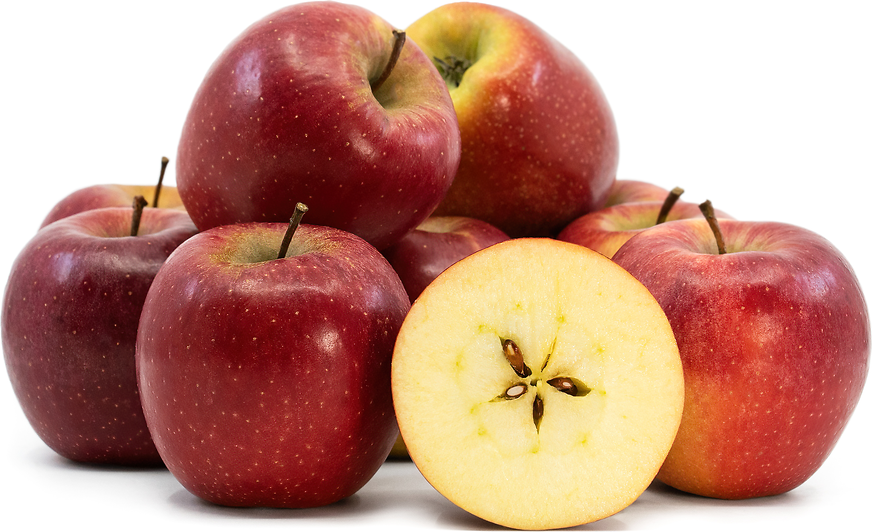


Galipette Apples
Estimated Inventory, lb : 0
Description/Taste
Galipette apples are a medium to large varietal, averaging 7 to 8 centimeters in diameter, and have a conical, uniform shape with broad shoulders tapering to a flat base. The apple’s stem is slender, long, brown, and woody, connecting to the fruit through a cavity occasionally filled with lightly textured russet. The skin is semi-thin, smooth, and taut, showcasing a faint sheen. The skin also ripens from green to golden yellow base hues, almost entirely covered in a dark red, maroon, or burgundy blush. The blush is generally solid, and the fruit’s surface features prominent white lenticels. Underneath the surface, the white-to-ivory flesh is fine-grained, aqueous, firm, and crunchy. The flesh also encases a central fibrous core filled with tiny black-brown oval to tear-drop-shaped seeds. Galipette apples are edible raw when ripe and release a sweet fragrance. The flesh has a sweet, fruity, and floral taste combined with slight acidity, creating a pleasantly balanced taste.
Seasons/Availability
Galipette apples are available from October through July.
Current Facts
Galipette apples, botanically classified as Malus domestica, are a French variety belonging to the Rosaceae family. The late-season cultivar is a premium apple valued for its disease and pest resistance, crunchy nature, and sweet taste. Galipette apples are exclusively produced in France and are promoted with the slogan “The French Taste.” The bi-colored apples are only grown by select producers under the French brand Mylord’, which is known for cultivating apples with an awareness of maintaining biodiversity in orchards. The apples are also sold loose or notably placed in eco-designed, plastic-free packaging ranging from trays to punnets, a conscious effort of the Mylord’ brand. Galipette apples are a high-end but attainable variety sought after by consumers for their extended shelf life. The variety is primarily consumed fresh but is also considered multi-purpose, capable of being used in a wide array of fresh and cooked culinary preparations.
Nutritional Value
Galipette apples have not been extensively studied for their nutritional properties. Like other commercial bi-colored apples, the variety may be a source of vitamin C to boost the immune system, fiber to regulate the digestive tract, and potassium to balance fluid levels within the body. Apples also provide calcium to build strong bones and teeth, magnesium to control nerve functions, iron to develop the protein hemoglobin for oxygen transport through the bloodstream, and other nutrients, including manganese, copper, zinc, phosphorus, vitamin E, and vitamin A. The apple’s pigmented skin indicates the presence of anthocyanins, pigments with antioxidant properties to reduce inflammation and protect the cells against the damage caused by free radicals.
Applications
Galipette apples have a sweet, subtly tangy taste suited for fresh and cooked preparations. The variety is primarily consumed out of hand and can be eaten with or without the skin, depending on preference. Galipette apples can be sliced and served on cheese boards, tossed into salads, or used as an edible topping over parfaits, pancakes, oatmeal, and grain bowls. The apple’s sweet taste also complements rich dips as a snack, and the flesh can be layered into sandwiches and burgers for added crunch. Try thinly slicing Galipette apples and serving them on crostini or chopping them into fruit medleys. In addition to fresh preparations, Galipette apples can be simmered into jams, jellies, and preserves, cooked into syrups, or made into sauces as a side dish. The variety can also be used in desserts, baked goods, or caramelized and served as a decadent topping over ice cream. Galipette apples pair well with herbs such as mint, parsley, and rosemary, spices including nutmeg, cinnamon, and ginger, nuts such as almonds, walnuts, and pecans, and fruits including strawberries, mangoes, grapes, and pineapple. Whole, unwashed Galipette apples will keep for several weeks to months when stored in a cool, dry, and dark place, such as the cellar or refrigerator’s crisper drawer.
Ethnic/Cultural Info
Galipette apples are notably cultivated by Mylord’ growers that are a part of the Bee Friendly® Certification. According to the Bee Friendly® website, bee populations are declining due to intensive agriculture. The use of harmful pesticides, habitat destruction, and other practices are leading more than 30% of bee colonies to disappear in France each year. The Bee Friendly® Certification is a pledge to grow apples that will not hurt the bee population but instead promote biodiversity. Certified growers create partnerships with beekeepers to allow them plots to establish hives, create new habitats, preserve old ones, and reduce the amount of products used on the trees. Products and other human interventions are typically enacted at night when bees are not active, preventing the insects from encountering the treatment plans. Beyond the methods of protecting and preserving, Mylord’ growers also open their orchards to the public and schools for increased education on biodiversity and how everyone can play a role in this process to create a sustainable agricultural ecosystem.
Geography/History
Galipette apples are native to France and are grown, packaged, and marketed through Mylord’, a brand supported by apple growers in the Loire Valley of France. Mylord’ has been run by French growers for over five generations, and valuable generational knowledge of terroir has been passed on to produce high-end apples with a focus on environmentally friendly practices. The brand is connected to the Sica Gerfruit consortium and controls the entire production cycle. Galipette apples were developed from a cross between Gala apples, a New Zealand variety, and Esopus Spitzenburg apples, an American variety. Galipette apples are exclusively grown in France and are a premium variety favored by consumers for their quality flavor, appearance, and taste. Today Galipette apples are cultivated in the mild and sunny weather of the Loire Valley, with Mylord’ growers found in Maine-et-Loire, Indre-et-Loire, and Sarthe. The apples are seasonally sold through select retailers and distributors in Europe.




